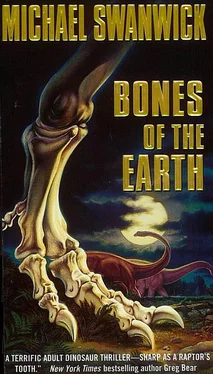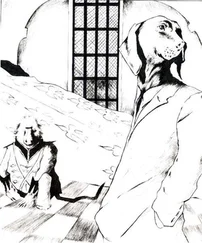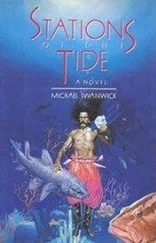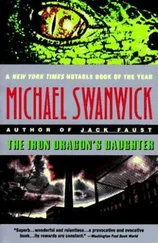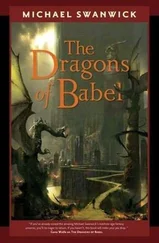Finally, though, somebody realized that it was time for lunch and the dishes hadn’t been washed, and everybody scattered to their assigned cooking and setup chores.
Tamara lingered behind, to have a quiet word with Leyster.
“Well, my hat’s off to you. You pulled us all together. I really didn’t think you could do it.”
Leyster took her hand, gently kissed one knuckle, and did not let it go. He felt like a fraud. He had become a paleontologist at least in part because he found dinosaurs comprehensible in a way that people were not. It was a terrible thing to be so deceitful. “I think last night had a lot to do with it.”
“Last night was nice.” She smiled, and he fleetingly wondered if it was possible she was putting on an act too. Then rejected the thought as paranoia. “But it just happened. This morning was premeditated.”
“Maybe just a little,” he admitted. “The problem was that when all you’re trying to do is survive, the universe seems a cold and hostile place. We needed a purpose. To distract us from our awareness of being a single spark of human warmth in an infinite expanse of silence. One small candle in the infinite night of being.”
“Do you really think science is purpose enough?”
“Yes, I do. I always have. Maybe it’s because I was a lonely kid, and there were times when learning things was all that kept me going. The search for truth is not an unworthy reason to keep going.”
“You make it sound so arbitrary.”
“Maybe it is. Yet I persist in believing that knowledge is better than ignorance.” He was silent for a moment. “I was in Uppsala, Sweden, once. In the floor of the Domkyrka, the Cathedral, there, I found Linnaeus’s gravestone.”
“Carl Linnaeus, you mean? The inventor of binomial nomenclature?”
“Yeah. It was a fine-grained gray stone with two fossil belemnites swimming across its surface, like pale comets. Linnaeus didn’t even know what fossils were. During his lifetime, Voltaire quite seriously suggested they were the petrified remains of pilgrims’ lunches. But there they were, like guardians assigned him by Nature in gratitude for his work.” He let go of her hand. “Why should I find that comforting? Yet I do.”
* * *
After lunch, Leyster stayed behind to work on the smokehouse, while Katie took a party out to make the first observations. They were all laughing and chattering, as they left, as cheerful as children and as heedless of the danger. Watching them, Leyster felt the same sickening fear for them that he imagined a parent must experience the first time a child is allowed to leave the house by itself.
He wanted so hard to protect them, and knew he could not. They were all buoyed up by what had happened last night. But all their confidence, all their joy, would not be enough to keep them safe. They would have to be continually on their guard. In this world, the night might belong to mammals, but dinosaurs ruled the day.
Xanadu Station: Mesozoic era. Cretaceous period. Gallic epoch. Twonian age. 95 My B.C.E.
The meeting room was built into a cliff overlooking the Tethys Sea. Ordinarily the view through the glass wall was enough to fill the soul and elevate the spirit, and even at the exorbitant rates charged for its use, the room was booked solid for every clear day until its scheduled demolition. Today, however, the weather was dreary. A dull rain spattered against the windows and turned the ocean water gray.
Griffin sat in a leather conference chair, thinking about chalk.
It was only vertebrate chauvinism that made people think dinosaurs were the most important living things of their time. From the mid-Cretaceous onward, one of the most significant and varied families of organisms on Earth was the calcareous algae. Though microscopically small, these spherical plants had armored themselves with ornately structured overlapping calcium plates. The warm seas contained galaxies of calcareous algae, living uneventful lives and shedding their cunning little shields when they died.
The exoskeletal debris from the algae and other nannoplankton, both vegetal and animal, was constantly filtering down through the water, an eternal snowfall that deposited as much as six inches of finely-grained chalk on the ocean floor in a thousand years. The white cliffs of Dover were the patient work of billions of generations of tiny creatures leading orderly and bourgeois lives. Hopscotch diagrams and sidewalk artists’ naïve copies of The Last Supper, grammar school sentence diagrams and physicists’ equations, the sure kiss of a pool stick against a cue ball, the frictionless grip of a gymnast’s hands upon the high bar, all depended on the anonymous contributions of these placid beings.
Griffin often meditated upon this. The thought that such transient lives served the diverse purposes of a higher order of life pleased him. He wondered sometimes if the human race would leave behind a legacy half so enduring. Such thoughts calmed him, usually.
Not today.
Today, everything was fucked. Griffin had come at last, as he’d always known he would, to a dead end. The fairy castle he had built out of playing cards and hope was trembling in the breeze. Any second now, it would collapse. Everything he’d worked for, the sacrifices he’d made, the hard and sometimes cruel decisions that had been forced on him—all was come to futility. Everything was fucked and done for.
The door opened and closed behind him. He did not need to look to know that Salley had entered the room. She came up behind him and placed her hands on his shoulders. Briefly, she kneaded the muscles. They were stiff and knotted.
“All right,” she said. “What is it?”
There were so many responses he could have made. Almost at random, he said, “I’ve never hit a woman.” He could see her ghostly reflection in the window wall, tall and regal as a queen. Below her he was slumped in his leather armchair like a defeated king waiting for the barbarians to arrive. Their eyes met in the glass. “Today, I almost hit you.”
“Tell me why.”
* * *
Griffin had been away from Salley for a week when he finally returned to his room in Xanadu. But for her, it had only been a half hour. He knew because, as he always did in such cases, he’d written himself a memo.
His plan was simply to say a quiet goodbye. Salley was scheduled to leave on the Baseline Project expedition in the morning. Knowing what hardships she would face, and how long it would be before her rescue, he wanted to say something that would linger. Something that would, on reflection, offer her a touch of secret hope when it looked like she was stranded forever.
But when he’d tried saying the carefully composed words, she’d stopped his mouth with kisses. She’d hooked a leg behind him and shoved him on the chest, tumbling him down on the bed. Then she took his shirt in both hands and pulled, scattering buttons in all directions. What happened then should have been every bit as much fun as he’d had the first time with her.
It wasn’t, of course.
It made him feel guilty. There was no use denying that. But what choice did he have? Anything else would only have been that much crueler for her. So he was using her. So what? It hadn’t been his decision. She’d seduced him, for Christ’s sake! It would be different if it had been the other way around. But he wasn’t going to carry the can for a situation that was entirely of her own making.
Griffin had been married before, both times to women who ended up making him feel confused and defensive. Women who introduced chaos and emotion into what should have been an orderly existence. Women toward whom—it could not be denied—his feelings were mixed, even now.
Читать дальше
